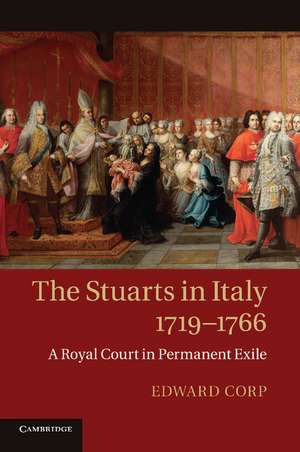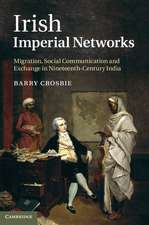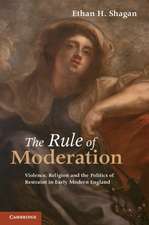The Stuarts in Italy, 1719–1766: A Royal Court in Permanent Exile
Autor Edward Corpen Limba Engleză Paperback – 22 ian 2014
| Toate formatele și edițiile | Preț | Express |
|---|---|---|
| Paperback (1) | 418.33 lei 43-57 zile | |
| Cambridge University Press – 22 ian 2014 | 418.33 lei 43-57 zile | |
| Hardback (1) | 847.12 lei 43-57 zile | |
| Cambridge University Press – 17 aug 2011 | 847.12 lei 43-57 zile |
Preț: 418.33 lei
Nou
Puncte Express: 627
Preț estimativ în valută:
80.05€ • 83.80$ • 66.23£
80.05€ • 83.80$ • 66.23£
Carte tipărită la comandă
Livrare economică 07-21 aprilie
Preluare comenzi: 021 569.72.76
Specificații
ISBN-13: 9781107629165
ISBN-10: 1107629160
Pagini: 430
Ilustrații: 30 b/w illus.
Dimensiuni: 152 x 229 x 22 mm
Greutate: 0.57 kg
Editura: Cambridge University Press
Colecția Cambridge University Press
Locul publicării:New York, United States
ISBN-10: 1107629160
Pagini: 430
Ilustrații: 30 b/w illus.
Dimensiuni: 152 x 229 x 22 mm
Greutate: 0.57 kg
Editura: Cambridge University Press
Colecția Cambridge University Press
Locul publicării:New York, United States
Cuprins
Introduction; Part I. Rome, 1719–29: 1. The Stuarts and the Papacy: I; 2. The Palazzo del Re; 3. James III, Queen Clementina and Roman society; 4. The Stuarts and Italian operatic life; 5. The portraits of the Stuarts and their courtiers: I; 6. The Jacobite courtiers, 1719–26; 7. Tensions within the Royal household, 1719–24; 8. The separation of the King and the Queen, 1725–6; Part II. Bologna, 1726–9: 9. The division of the Court, 1726–7; 10. The reorganisation of the Court, 1727–9; Part III. Rome, 1729–66: 11. The Stuarts and the Papacy: II; 12. James III, the Stuart princes and Roman society; 13. The Stuarts and Italian music; 14. The portraits of the Stuarts and their courtiers: II; 15. The composition of the Court, 1729–47; 16. Freemasons and factions within the Royal household, 1729–47; 17. The decline of the Court, 1747–66; Conclusion.
Recenzii
'Corp's books on the topic of the Stuart Courts have always been excellent, and they have been getting better. The Stuarts in Italy, 1719–1766 is absolutely outstanding in its detail, its findings, its implications, and its evidence base. If it is not to be the last word, someone is going to have to work very hard to say much else.' Murray Pittock, Journal of British Studies
'… this book will become the standard reference for any scholar who is interested in the operations of the Stuart court in Italy after 1719 … well-written and cogently organized … For almost fifty years, in spite of the failure of Jacobite conspiracies and rebellions in the British Isles, James III's court maintained a regal presence in the papal city, which did not fade until the dawning of the age of revolutions. This alone makes it worthy of Corp's finely detailed study.' Paul Monod, H-Albion (h-net.org/~albion)
'A superbly researched and wonderfully detailed account.' undiscoveredscotland.co.uk
'This is an excellent piece of historical scholarship, based on impressive work and a mastery of the subject. It shows to those who still think that inevitably is part of history that this is not the case and that history remains more fascinating if less schematic than one might think.' Contemporary Review
'Corp ably switches back and forth from the specifics of court life at the Palazzo del Re to the significance of this Roman court in the wider story of both European Jacobitism and Roman society … Corp's book shows that he knows everything possible about the circumstances of his field … All in all, he has produced a worthy conclusion to his two initial volumes on the post-1688 Stuart court.' James J. Sack, The Journal of Modern History
'Edward Corp is one of the most eminent historians of the exiled Stuarts and their Jacobite courts … His new book on the 'permanent exile' of the Old Pretender … is lucid, engaging and well organized, containing much new material that shines light onto the world of the exiled Stuarts in Italy.' Stephen Brogan, European History Quarterly
'… this book will become the standard reference for any scholar who is interested in the operations of the Stuart court in Italy after 1719 … well-written and cogently organized … For almost fifty years, in spite of the failure of Jacobite conspiracies and rebellions in the British Isles, James III's court maintained a regal presence in the papal city, which did not fade until the dawning of the age of revolutions. This alone makes it worthy of Corp's finely detailed study.' Paul Monod, H-Albion (h-net.org/~albion)
'A superbly researched and wonderfully detailed account.' undiscoveredscotland.co.uk
'This is an excellent piece of historical scholarship, based on impressive work and a mastery of the subject. It shows to those who still think that inevitably is part of history that this is not the case and that history remains more fascinating if less schematic than one might think.' Contemporary Review
'Corp ably switches back and forth from the specifics of court life at the Palazzo del Re to the significance of this Roman court in the wider story of both European Jacobitism and Roman society … Corp's book shows that he knows everything possible about the circumstances of his field … All in all, he has produced a worthy conclusion to his two initial volumes on the post-1688 Stuart court.' James J. Sack, The Journal of Modern History
'Edward Corp is one of the most eminent historians of the exiled Stuarts and their Jacobite courts … His new book on the 'permanent exile' of the Old Pretender … is lucid, engaging and well organized, containing much new material that shines light onto the world of the exiled Stuarts in Italy.' Stephen Brogan, European History Quarterly
Notă biografică
Descriere
This book reassesses the lives of the exiled Stuart Court in Italy which provided an important British presence in Rome.










